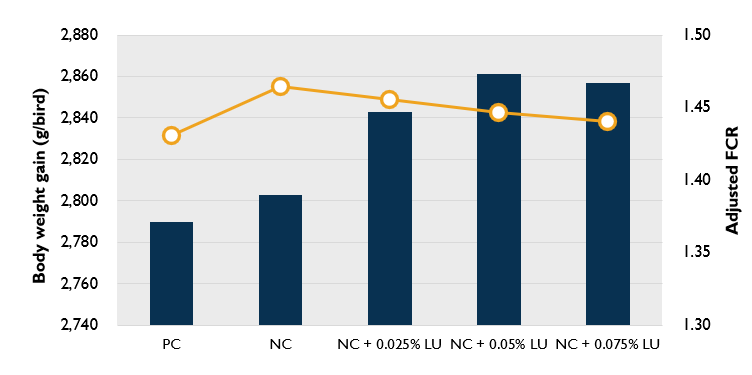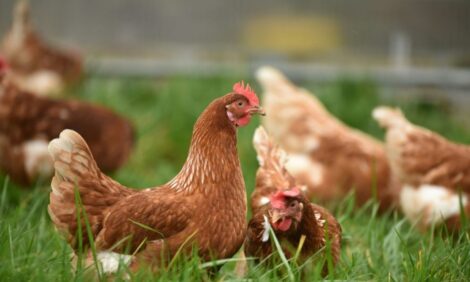



Strategic supplementation of Lipidol® Ultra in turkey diets
Lipidol Ultra can replace dietary fat minimizing issues during the feed production and feeding processesFat in turkey diets: pros and cons
Commercial turkeys for meat production require a substantial amount of energy for optimal growth, especially during the finishing phases of production. To meet the metabolizable energy (ME) requirement of turkeys, supplemental fats such as soybean oil or poultry fat have been generally added to diets for turkeys. Supplemental fats are energy-condensed feed ingredients as a purified free form of fat extracted from oilseeds or isolated during meat processing. The concentration of supplemental fat in turkey diets typically ranges from 4 to 8%, depending on gender, stage of growth, and season (i.e., environmental temperature). Although it is inevitable to include high concentrations of fat in diets for turkeys, it causes several issues in turkey production. Firstly, the price of fat ingredients has been unstable in recent years. Due to the increased demand for soybean oil from the biofuel industry and unstable production and trading in the international market, the price of overall fat ingredients has largely fluctuated. Therefore, high concentrations of dietary fat often result in increased feed costs. Secondly, the quality of the pellet may be negatively affected by high concentrations of dietary fat. Commercial turkey diets are generally produced as pellets, and thus, the quality of the pellet directly affects the efficiency of turkey production. Low quality of pellet may increase loss of feed during handling and feeding. In addition, the efficiency of the pelleting process may be reduced by adding high concentrations of fat to diets. Lastly, high concentrations of fat in diets may cause clogging of diets in auger during winter. Vegetable oils become thicker than normal and animal fats become solid during winter, which may cause clogging of diets in the conveyer system and failure of feed delivery to the feeder. Therefore, the concentration of fat in diets is sometimes reduced during winter, resulting in negative impacts on the growth performance of turkeys. To mitigate the negative impacts of high dietary fat concentration, an innovative solution is needed to minimize the loss of production efficiency and maximize the profit of turkey production.
Elevated absorption of energy byLipidol® Ultra
Lipidol Ultra is a unique feed additive containing lysophospholipids (LPL) as major bioactive components. The molecular structure of LPL consists of one phosphate head and one fatty acid tail, which is similar to that of phospholipids. Because phospholipids are the major component of the epithelial cell membrane, dietary LPL is immediately absorbed into the epithelial cell membrane, leading to increased fluidity of the cell membrane and nutrient absorption. In addition, the activity and activation time of transporter proteins is also positively affected by dietary LPL supplementation because increased fluidity of the cell membrane enhances the activation (i.e., conformation change of transporter proteins) and maintains the activated status of transporter proteins. Therefore, dietary LPL improves the absorption of sugars and amino acids, leading to improvements in dietary ME concentration. Dietary LPL also plays an important role in fat absorption. The mechanism of fat absorption is different from other nutrients as the formation of micelle is necessary for the absorption into the epithelial cell by endocytosis. Lysophospholipids can form the micro-micelle, which can be readily absorbed into the epithelial cell with a greater absorption rate than regular micelle. Therefore, feeding Lipidol Ultra enhances the absorption of dietary sugars, amino acids, and fat, which increases the concentration of ME in diets for turkeys. Increased ME concentration by Lipidol Ultra enables to reduction of the amount of fat added into diets and mitigate the aforementioned issues with feeds containing excessive amount of fat.
Fat replacement effect of Lipidol® Ultra in turkey diets
An experiment was conducted to evaluate the effects of Lipidol Ultra in ME-reduced diets on the growth performance of turkey poults during the brood phase (Park et al., 2024). A total of 1,050 turkey poults were assigned to five experimental diets with 15 replicates per diet. Experimental diets were prepared as follows: positive control (PC) as commercial diets for turkey poults; negative control with the reduction of ME by 150 kcal/kg from PC diets; and NC diets containing Lipidol Ultra at 0.025%, 0.05%, and 0.075%. Soybean oil was replaced with corn in NC diets to reduce the concentration of ME in diets. Turkey poults were fed experimental diets from day 0 to 42 post-hatching. As a result, the final body weight of birds tended to linearly increase (P = 0.077) as the concentration of Lipidol Ultra in NC diets increased. From day 0 to 42 of the experimental period, there was a linear tendency (P = 0.076) in body weight gain of birds with increasing concentrations of Lipidol Ultra in NC diets (Figure 1). The feed conversion ratio (FCR) of birds was linearly reduced (P = 0.032) when the dietary concentration of Lipidol Ultra increased. During the overall experimental period, the FCR of birds fed the PC diets was not different from those fed Lipidol Ultra at 0.075%. This experiment revealed that impaired FCR of turkey poults fed reduced ME diets by 150 kcal/kg and was improved by feeding Lipidol Ultra at 0.075%.

Conclusions
Dietary fat is an important feed ingredient in turkey diets as high concentration of dietary ME is required for optimal growth performance of birds. However, high inclusion of dietary fat may cause technical issues during the production of pellet and feeding processes at the farm. Lipidol Ultra can increase the concentration of ME in diets by improving the absorption of nutrients, and therefore, dietary fat can be partially replaced with Lipidol Ultra for least cost formulation and for minimizing issues during the feed production and feeding processes.
| References | ||||
|---|---|---|---|---|
| Park, C. S., D. Moore, H. O. Pavlidis, J. Snow, J. H. Jeong. 2024. Growth performance of turkey poults fed diets containing lysophospholipids. In: Proceedings of 2024 International Poultry Scientific Forum, Atlanta, GA. in-press. | ||||








